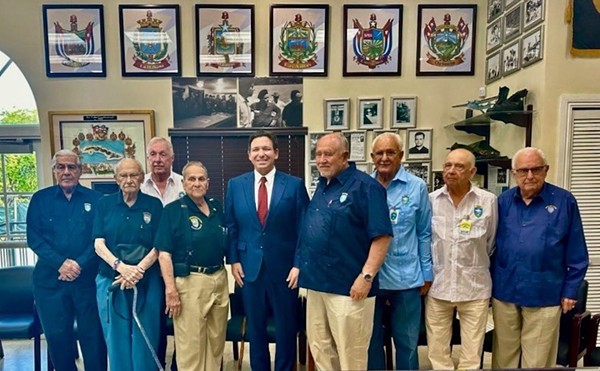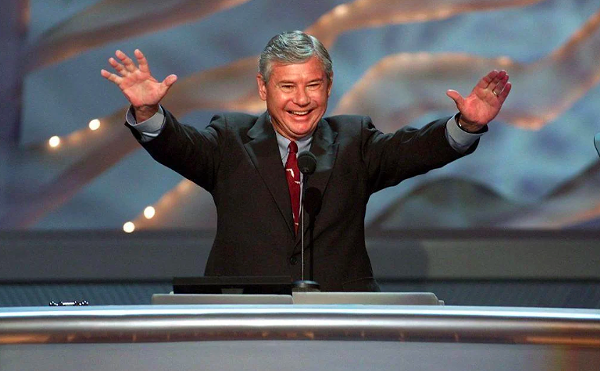Don't expect miracles here. After wowing the moviegoing world with the cinematic razzle dazzle of Boogie Nights and Magnolia, Paul Thomas Anderson wasn't out to top himself again with his new film. And frankly, after something as epic, intricate and ambitious as Magnolia, where else was there to go but down?Since expanding on something as massive as Magnolia probably wasn't possible (or desirable), the obvious option was to scale it all back, to shrink things down and — as much as it's possible for an angst-ridden auteur like Anderson — to have fun with it. The result is Punch Drunk Love, a very strange little movie that's both lighter than air and denser than the biggest black hole on the block.
This is a movie made up of contradictions, and chief among the inexplicable oddities of Punch Drunk Love is that it stars Adam Sandler, quite possibly the last person you would expect to find in a Paul Thomas Anderson film.
Sandler and Anderson would seem to exist at opposite poles of the cultural universe. One is the critical darling of contemporary cinema and a maker of complex, uncompromising works of art that somehow manage to connect with the public. The other is a hugely popular entertainer almost universally reviled by critics for a broad, buffoonish style of comedy aimed directly at the lowest common denominator.
Whether Anderson is serious when he claims that Sandler is a genius is open to debate. I tend to believe him, since life, as we're so often told, is stranger than fiction. What isn't debatable is that Punch Drunk Love stretches our definitions of who we expect both of these men to be. If you thought Jennifer Aniston's admirers had a hard time dealing with The Good Girl, wait until you get a load of the legions of Sandler fans freaking out over this baby.
Punch Drunk Love was inspired by a newspaper clipping about a man who made out like a bandit buying tubs of cheap, instant pudding and trading them in for enough frequent flyer miles to last him several lifetimes. There's not much more to the story than that, although Anderson adds a romantic interest and a phone sex exchange gone bad that leads to a series of outrageous encounters and a chase scene or two — action so perversely unexciting it feels more like anti-action. Also, as you might expect, there's an assortment of odd characters who serve no purpose other than to amuse us and who show up at exactly the moment we least expect them to.
The movie is slight and, in its own bizarre way, sweet, with an extravagantly screwy beauty that feels like it might very well have come about from too many drugs or too little sleep. If Magnolia was a symphony; Punch Drunk Love is a late-night jam session, sweetened and refined in the studio. There's a throwaway quality to the film that must have been incredibly refreshing to Anderson, and the whole thing unfolds with the transparent ease and simplicity of a sketch — or rather, a series of sketches, all loosely connected and very oddly framed.
The case could be made that Punch Drunk Love might have been better served by someone with actual talent in its lead role, but Anderson appears here to have been after something closer to "presence" than conventional acting chops. (I'm tempted to throw out the name Jerry Lewis at this point, but I'll leave that task for one of my colleagues in France.) What Sandler achieves in Punch Drunk Love is not a radical transformation — this is no Jim Carrey "See, I can act!" performance a la The Truman Show — but even the comedian's most passionate detractors will probably be intrigued by the nature of his collaboration with Anderson.
Barry Egan, Sandler's character in Punch Drunk Love, is essentially another spin on Sandler's familiar doofus man-child screen persona. He's socially awkward, dateless and spends his free time cruising supermarket aisles, waiting for the pudding to talk to him. Barry's never been on a plane before, has seven virtually identical-looking sisters who cast a loony shadow over his life and, from time to time, is prone to kicking in windows for no particular reason.
Anderson takes the instantly recognizable Sandler persona and reconfigures it, making the character of Barry Egan both infinitely more extreme and more genuine than the comedian's stock role.
Barry is passive-aggressive in much the same way as any of the characters Sandler plays in his low-brow Hollywood comedies, but there's almost nothing condescendingly cute or middle-of-the-road about what he does here. When Billy Madison or Happy Gilmore commit some outrageous act of physical abuse-as-comedy and then ask the audience for a big hug, it seems like a cheap shot. When Barry Egan smashes up the place and goes nuts, we feel like this guy is really nuts, and it generates laughter that's genuine, albeit nervous. Anderson takes whatever extreme thing you expect an Adam Sandler character to do, takes it to its furthest limit, and then pushes it even further.
Similarly, when Barry gets real, he's very real. "Sometimes I don't like myself very much," confides Barry out of the blue at one key moment, an off-the-cuff cry for help in the movie's rolling sea of comedic chaos.
Barry's a fascinating train wreck of a human, but still recognizable as the guy who played Happy Gilmore. Anderson lays claim to that persona and recontextualizes it, toning everything down or up a few notches, dressing Sandler in a day-glow blue suit and then positioning him dead-center in the bedlam, like a postmodern Buster Keaton reacting to a series of increasingly absurd situations.
Say what you will about Sandler, but he makes a fine anchor for a film that, left to its own devices, might easily have simply flown off into the stratosphere.
The movie playfully bludgeons us with one absurd sight and sound gag after another, and the weirdness just keeps piling up. Not a whole lot of it is explained. If you were befuddled by the scene in Magnolia where frogs suddenly rain down from the heavens, consider proceeding no further. Things inexplicably fall from the sky on a regular basis in Punch Drunk Love, from the film's enigmatic first moments involving a mysterious harmonium that seems like it ought to be a symbol of something but probably isn't.
Barry obsesses over a frequent flyer coupon promotion, incurs the wrath of an irate sex line operator, falls in love, gets chased by siblings from Utah, goes back to his job selling unbreakable toilet plungers that break. The movie is punctuated by a stream of mysterious, calamitous events, and a big part of its comedic charm is that its puzzles and catastrophes are rarely commented on.
Virtually nothing in the film happens the way we think it should, beginning with the opening credits that never quite appear. The rhythms here are harsh, jagged and irregular (intensified by the edgy, percussive score of Jon Brion), and the use of sound may just be the most radical thing about the film.
Form clearly takes precedence over content in Punch Drunk Love, but there's nothing remotely stiff or academic about it. The orchestrated anarchy on display is for the most part as pleasurable as it is unusual, and it owes much to the glory days of Jacques Tati and Richard Lester (Anderson acknowledges Help! as an influence).
Punch Drunk Love can be enjoyed on many levels — as an intriguing experiment, as a subversive hacking away at Hollywood conventions, as one hell of a curious comedy — but in the end it might most accurately be described as a portrait of the artist during down-time. The movie touches on an assortment of ideas and movie genres, apparently just so Anderson can deconstruct them, but the real purpose of Punch Drunk Love seems to be to have no real purpose. The bottom line is that Anderson appears to be having a good time here, playfully re-arranging the basic building blocks of moviemaking for no reason at all outside of the sheer joy of doing it.
Lance Goldenberg can be reached at [email protected] or 813-248-8888, ext. 157.
















